Gianna1
On this page, you find all documents, package deals, and flashcards offered by seller Gianna1.
- 1024
- 0
- 46
Community
- Followers
- Following
1070 items
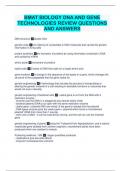
BMAT BIOLOGY DNA AND GENE TECHNOLOGIES REVIEW QUESTIONS AND ANSWERS
DNA structure double helix genetic code the ordering of nucleotides in DNA molecules that carries the genetic information in living cells protein synthesis the formation of proteins by using information contained in DNA and carried by mRNA amino acids monomers of proteins triplet code 3 bases of DNA that code for a single amino acid gene mutation A change in the sequence of the bases in a gene, which changes the structure of the polypeptide that the gene codes for. genetic engineering A te...
- Exam (elaborations)
- • 2 pages •
DNA structure double helix genetic code the ordering of nucleotides in DNA molecules that carries the genetic information in living cells protein synthesis the formation of proteins by using information contained in DNA and carried by mRNA amino acids monomers of proteins triplet code 3 bases of DNA that code for a single amino acid gene mutation A change in the sequence of the bases in a gene, which changes the structure of the polypeptide that the gene codes for. genetic engineering A te...
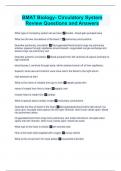
BMAT Biology- Circulatory System Review Questions and Answers
What type of circulatory system do we have double - blood gets pumped twice What are the two circulations of the Heart ? pulmonary and systemic Describe pulmonary circulation Deoxygenated blood enters lungs via pulmonary arteries. passes through capillaries around alveoli. oxygenated via gas exchange and leaves lungs via pulmonary vein Describe systemic circulation blood pumped from left ventricle all organs and back to right ventricle blood leaves L ventricle through aorta, which arteries b...
- Exam (elaborations)
- • 2 pages •
What type of circulatory system do we have double - blood gets pumped twice What are the two circulations of the Heart ? pulmonary and systemic Describe pulmonary circulation Deoxygenated blood enters lungs via pulmonary arteries. passes through capillaries around alveoli. oxygenated via gas exchange and leaves lungs via pulmonary vein Describe systemic circulation blood pumped from left ventricle all organs and back to right ventricle blood leaves L ventricle through aorta, which arteries b...
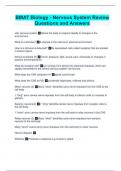
BMAT Biology - Nervous System Review Questions and Answers
Job: nervous system Allows the body to respond rapidly to changes in the environment What is a stimulus? A change in the internal or external environment How is a stimulus is detected? By specialised cells called receptors that are located in sense organs. Stimuli examples (5) Touch, pressure, light, sound, pain, chemicals or changes in position and temperature. What do receptors do? turn energy from stimuli into electrical impulses, which are rapidly transmitted to the central nervous syste...
- Exam (elaborations)
- • 3 pages •
Job: nervous system Allows the body to respond rapidly to changes in the environment What is a stimulus? A change in the internal or external environment How is a stimulus is detected? By specialised cells called receptors that are located in sense organs. Stimuli examples (5) Touch, pressure, light, sound, pain, chemicals or changes in position and temperature. What do receptors do? turn energy from stimuli into electrical impulses, which are rapidly transmitted to the central nervous syste...
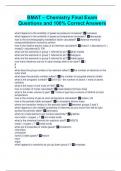
BMAT – Chemistry Final Exam Questions and 100% Correct Answers
what happens to the solubility of gases as pressure increases? increases what happens to the solubility of gases as temperature increases? decreases how is the chromatography retardation factor calculated? distance moved by compound/distance moved by solvent how is the relative atomic mass of an element calculated? (mass1 x abundance1) + (mass2 x abundance2)/ 100 what are the elements in group 1 referred to as? alkali metals what are the elements in group 7 referred to as? halogens what are the ...
- Exam (elaborations)
- • 5 pages •
what happens to the solubility of gases as pressure increases? increases what happens to the solubility of gases as temperature increases? decreases how is the chromatography retardation factor calculated? distance moved by compound/distance moved by solvent how is the relative atomic mass of an element calculated? (mass1 x abundance1) + (mass2 x abundance2)/ 100 what are the elements in group 1 referred to as? alkali metals what are the elements in group 7 referred to as? halogens what are the ...
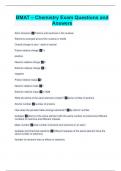
BMAT – Chemistry Exam Questions and Answers
Atom structure Protons and neutrons in the nucleus Electrons arranged around the nucleus in shells Overall charge is zero - atom is neutral Proton relative charge 1+ positive Neutron relative charge 0 Electron relative charge 1- negative Proton relative mass 1 Neutron relative mass 1 Electron relative mass 1/1836 What do atoms of the same element contain? same number of protons Atomic number number of protons How does the periodic table arrange elements? By atomic number Isotopes A...
- Exam (elaborations)
- • 36 pages •
Atom structure Protons and neutrons in the nucleus Electrons arranged around the nucleus in shells Overall charge is zero - atom is neutral Proton relative charge 1+ positive Neutron relative charge 0 Electron relative charge 1- negative Proton relative mass 1 Neutron relative mass 1 Electron relative mass 1/1836 What do atoms of the same element contain? same number of protons Atomic number number of protons How does the periodic table arrange elements? By atomic number Isotopes A...
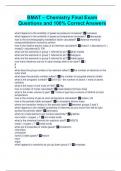
BMAT - Chemistry Electrolysis Review Questions and Answers
Electrolysis Compounds are broken down into simpler substances using electricity. In order to work, ions must be free to move so need to be dissolved in water or melted Electrolyte The liquid that conducts electricity How does electrolysis work There is a flow of electrons that are taken away from the positive electrode and given to other ions at the negative electrode. As ions gain or lose electrons they become atoms/molecules and are then released. Positively charged ions move to negative el...
- Exam (elaborations)
- • 5 pages •
Electrolysis Compounds are broken down into simpler substances using electricity. In order to work, ions must be free to move so need to be dissolved in water or melted Electrolyte The liquid that conducts electricity How does electrolysis work There is a flow of electrons that are taken away from the positive electrode and given to other ions at the negative electrode. As ions gain or lose electrons they become atoms/molecules and are then released. Positively charged ions move to negative el...
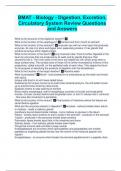
BMAT - Biology - Digestion, Excretion, Circulatory System Review Questions and Answers
What is the structure of the digestive system? What is the function of the oeophagus? Carries food from mouth to stomach What is the function of the stomach? muscular sac with an inner layer that produces enzymes. Its role is to store and digest food, especially proteins. It has glands that produce enzymes which digest protein. What is the function of the ileum? long muscular tube. Food is further digested in the ileum by enzymes that are produced by its walls and by glands that pour their secr...
- Exam (elaborations)
- • 2 pages •
What is the structure of the digestive system? What is the function of the oeophagus? Carries food from mouth to stomach What is the function of the stomach? muscular sac with an inner layer that produces enzymes. Its role is to store and digest food, especially proteins. It has glands that produce enzymes which digest protein. What is the function of the ileum? long muscular tube. Food is further digested in the ileum by enzymes that are produced by its walls and by glands that pour their secr...
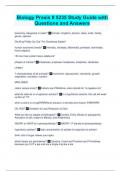
Biology Praxis II 5235 Study Guide with Questions and Answers
taxonomy categories in order? Domain, kingdom, phylum, class, order, family, genus, species Did King Phillip Cry Out "For Goodness Sakes!" human taxonomic levels? Animalia, chordata, Mammalia, primatae, hominidae, homo sapiens "All cool men prefer heavy sideburns" phases of mitosis? Interphase, prophase metaphase, anaphase, telophase I-PMAT 7 characteristics of all animals? movement, reproduction, sensitivity, growth, respiration, excretion, nutrition MRS GREN cation verses anion? Ca...
- Exam (elaborations)
- • 34 pages •
taxonomy categories in order? Domain, kingdom, phylum, class, order, family, genus, species Did King Phillip Cry Out "For Goodness Sakes!" human taxonomic levels? Animalia, chordata, Mammalia, primatae, hominidae, homo sapiens "All cool men prefer heavy sideburns" phases of mitosis? Interphase, prophase metaphase, anaphase, telophase I-PMAT 7 characteristics of all animals? movement, reproduction, sensitivity, growth, respiration, excretion, nutrition MRS GREN cation verses anion? Ca...
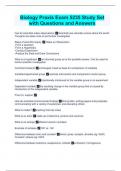
Biology Praxis Exam 5235 Study Set with Questions and Answers
how do scientists make observations Scientists are naturally curious about the world. Thoughts are taken note of and further investigated Steps of scientific inquiry -Make an Observation -Form a Question -Form a Hypothesis -Conduct Experiment -Analyze the Data and Draw Conclusions What is a hypothesis an informed guess as to the possible answer. Can be used for further scientific investigation Controls/constants unchanged. Used as base for comparison of variables Variable/experimental group ...
- Exam (elaborations)
- • 27 pages •
how do scientists make observations Scientists are naturally curious about the world. Thoughts are taken note of and further investigated Steps of scientific inquiry -Make an Observation -Form a Question -Form a Hypothesis -Conduct Experiment -Analyze the Data and Draw Conclusions What is a hypothesis an informed guess as to the possible answer. Can be used for further scientific investigation Controls/constants unchanged. Used as base for comparison of variables Variable/experimental group ...
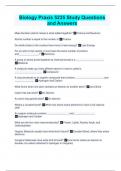
Biology Praxis 5235 Study Questions and Answers
Mass Number (atomic mass) is what added together? Protons and Neutrons Atomic number is equal to the number of Protons Do shells closer to the nucleus have more or less energy? Less Energy For an atom to be neutral, it must have the same number of protons and_______________? Electrons A group of atoms joined together by chemical bonds is a ____________________. Molecule A molecule made up of two different atoms or more is called a ____________________. Compound A macromolecule is an organi...
- Exam (elaborations)
- • 13 pages •
Mass Number (atomic mass) is what added together? Protons and Neutrons Atomic number is equal to the number of Protons Do shells closer to the nucleus have more or less energy? Less Energy For an atom to be neutral, it must have the same number of protons and_______________? Electrons A group of atoms joined together by chemical bonds is a ____________________. Molecule A molecule made up of two different atoms or more is called a ____________________. Compound A macromolecule is an organi...
